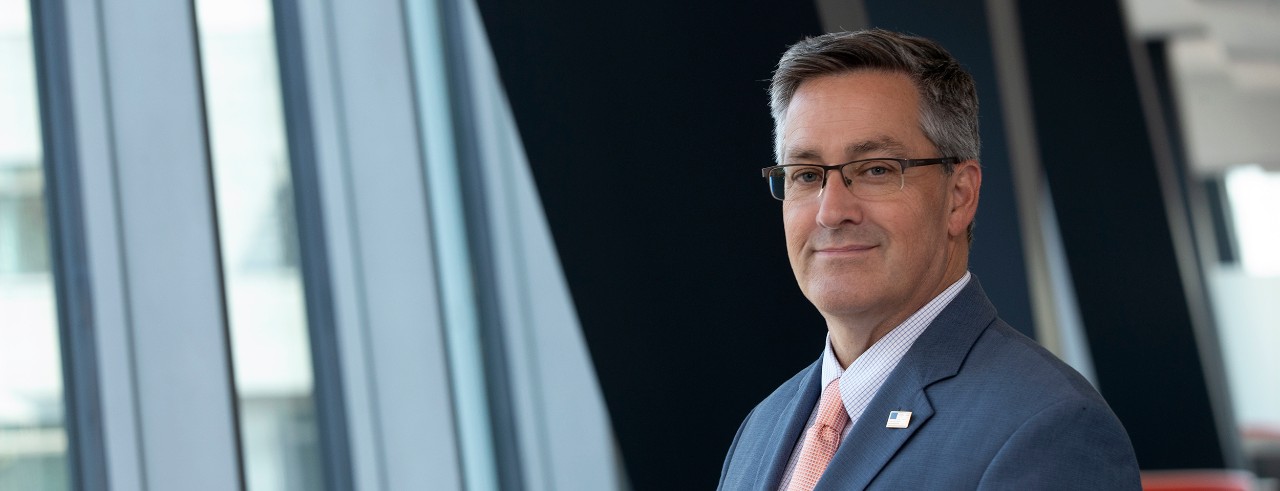
UC faculty are trusted media sources during Ukraine/Russia conflict
Faculty cited as experts by local, regional, national and international media during crisis
In early February, weeks before the current Russian invasion, The Christian Science Monitor published a feature on cyberspace as the new frontier of warfare, and how cyber-attacks could evolve to the level of breaching NATO’s Article 5 (an attack against one is an attack against all).
“Strategy as it’s currently being pioneered is less about trying to arrest all hacking operations — an unrealistic prospect given the interconnectedness of the internet — as it is to understand and shape them so allies can better protect themselves,” said Professor Richard Harknett, director of UC’s School of Public and International Affairs, who was among leading experts cited in the article.
At the time of publication, a Russian ground invasion of Ukraine was suspect, but not yet a reality.
Once the invasion started, however, Harknett and several members of the school's faculty received a flurry of media calls for their expertise in not only cybersecurity but also in all elements of war, military operations, American foreign policy, grand strategy and nuclear strategy.
For example, once the Russians had advanced into the Ukraine, Brendan Green, associate professor of public and international affairs, who is an expert on international affairs specific to the Ukraine, was featured on ABC News, Australia. The interview has been syndicated globally.
Other experts, who are cited in media include Ivan Dinev Ivanov and Gregory Winger, both on faculty in the School of Public and International Affairs, and Willard Sunderland, a professor in UC's Department of History, in the College of Arts and Sciences.
Media mentions, in date order:
- The Christian Science Monitor: With Russian hackers in mind, NATO takes hard look at cyber strategy (Harknett)
- ABC News, Australia: Why Russia's taken Chernobyl and why Ukraine should feel 'betrayed' by the West (Green)
- Cincinnati Edition: Russia attacks Ukraine; plus more to discuss with the Political Junkie (Ivanov)
- Spectrum News 1: Russia-Ukraine tensions date back to 2014 (Green)
- CSO News Analysis: Wiper malware targets Ukraine as military conflict extends into cyberspace (Winger)
- WCPO: Videos, photos of Russia's invasion of Ukraine spreading at 'unprecedented' speeds in human history (Winger)
- ABC News:"Biden, Zelenskyy hold call as Ukraine defends against intensifying Russian attacks." (Green)
- WCPO: UC expert urges vigilance in face of possible Russian cyberattacks (Harknett)
- WLWT: Cincinnati residents worry rising gas prices is start of painful trend amid Russian invasion (Sunderland)
Featured image at top of Richard Harknett. Colleen Kelley/UC Creative + Brand
Impact Lives Here
The University of Cincinnati is leading public urban universities into a new era of innovation and impact. Our faculty, staff and students are saving lives, changing outcomes and bending the future in our city's direction. Next Lives Here.
Related Stories
'Paradigm-shifting' study confirms effectiveness of long-acting HIV treatment
February 26, 2026
The results of a clinical trial involving the University of Cincinnati, recently published in The New England Journal of Medicine, show people failing HIV treatments with oral medications were able to be treated successfully using injections.
How do horses whinny?
February 26, 2026
A horse makes the low-pitched part of its whinny by vibrating its vocal cords — similar to how humans speak and sing — and the high-pitched part by whistling with its voice box, according to a new paper published in the journal Current Biology and featured in Smithsonian magazine.
UC receives grant for AI use in medical education
February 26, 2026
The University of Cincinnati is turning to artificial intelligence to help solve a problem in medical training. The College of Medicine was awarded a grant valued at more than $1 million to use AI in advanced physician training through personalized learning.
